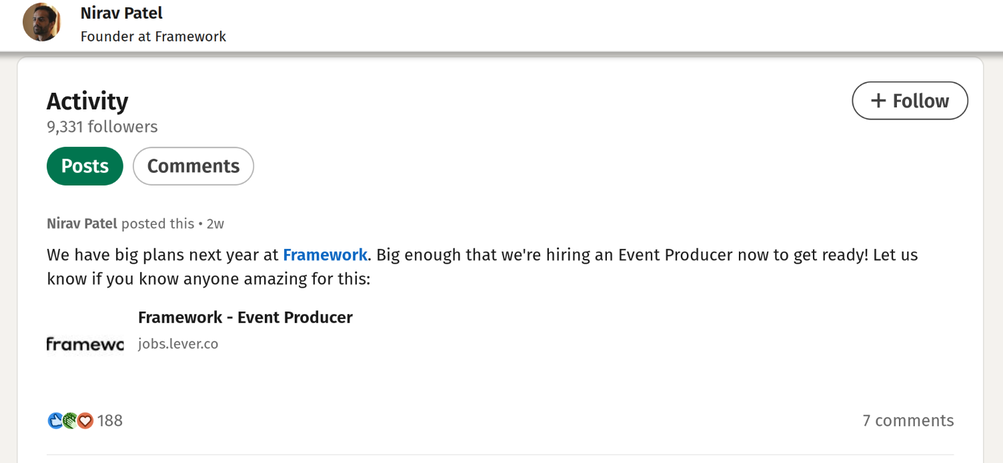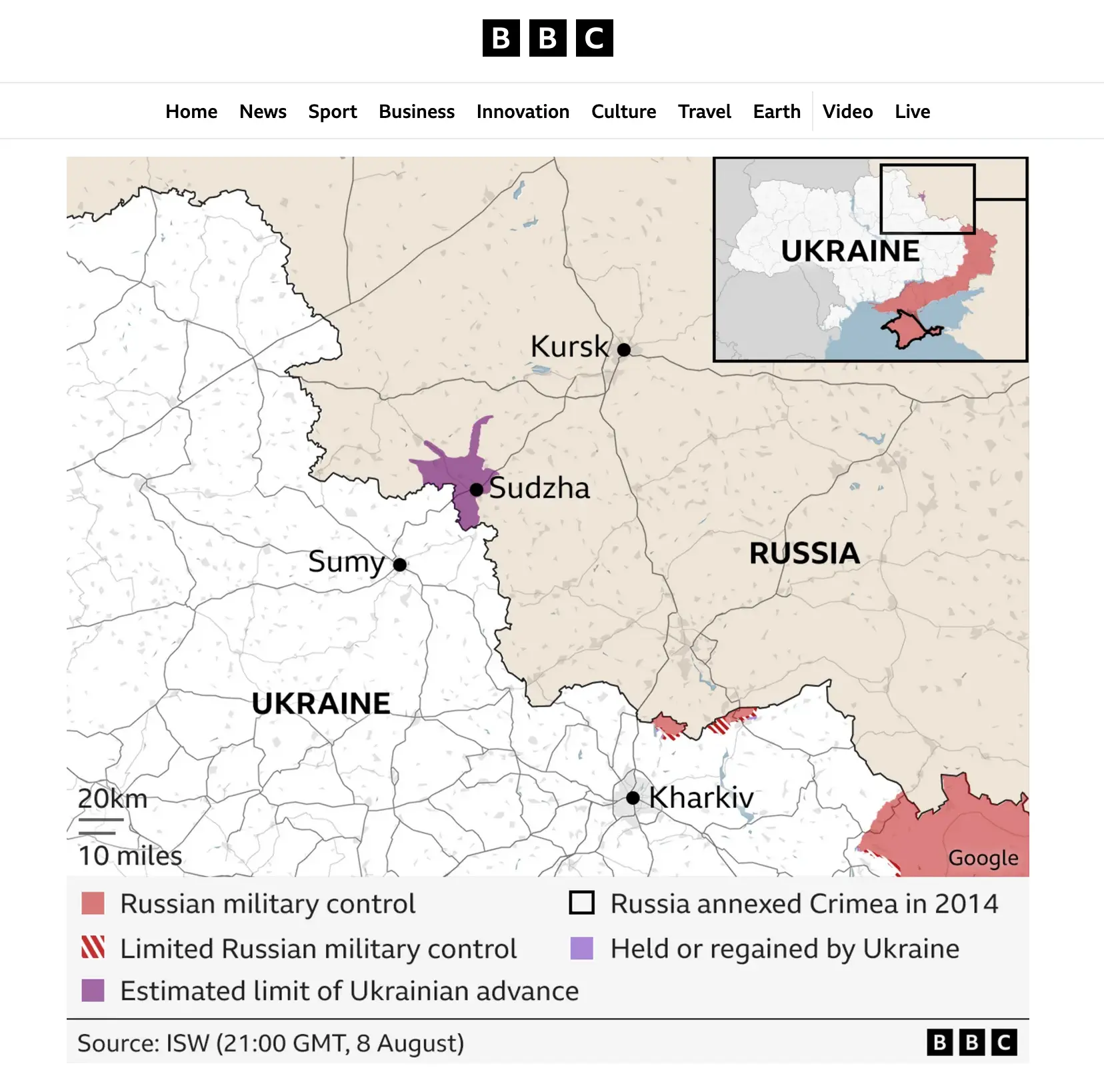There is a certain strain of open source development that is nearly anti-marketing, as far as I can tell. They choose names like "gimp", "git", "frotz", "borg", "pooch", "butt", "slurm", "mutt", "snort", and "floorp".
I had some trouble with ZFS and kernel compatibility when upgrading the OS, so I switched to btrfs. It's been fine for 3 years now, including a kernel upgrade.
Mint is a great OS. I love its simplicty.
What did your Framework laptop "unlock" for you?
I'm curious if the swappable ports, upgradable and repairable hardware, or some other aspect of the laptop design unlocked something specific for you?
For example: I was surprised to find out that gaming was easier with my mouse when I had the option to move the old USB-A port to the left-hand side, so the mouse cord loops around the back of the laptop and doesn't get in the way. I know, I could get a cordless mouse, but I guess I like classic hardware :D
Another example: There was a bug in the Linux kernel a year or two ago where high DPI screens would go dark intermittently when you had only 1 memory stick (SO-DIMM) in single-channel mode. I think they eventually fixed it, but to speed things up and get a working system for myself right away, I was able to order a 2nd SO-DIMM module and upgrade to 64GB of RAM in dual-channel mode. Gratefully, the problem was solved.
If you have a Framework, have you had similar or perhaps weirder unlocks?
I love this approach.
Nit: "If you can find prior art that describes such a system before June 13, 2013, you could be a winner." ... 2013 is a typo I'm guessing?
I want to say this kindly--perhaps you're joking or part joking when you say "people suck in general"--but I wonder if this is more of a reflection of your outlook than people in general. I mean, we're internet strangers so I'm not exactly insulted by being one of the people out here who suck in general, but I'd like to think that if we crossed the chasm, and actually got to know each other, we'd see humanity and goodness in each other (without diminishing the reality of individual weaknesses, poor skills, and bad habits).
Cool, let's keep each other posted. You keep me off Reddit, and I'll tell you what I hear from Nirav :)
What's our Lemmy + Framework niche?
I'm curious what you think our niche is here. There're obviously some much larger communities that focus on Framework hardware. But who are we, and why are we here?
For me, I'm trying to break my Reddit addiction and want to contribute my knowledge to the commons, rather than one corporation's pocketbook.
When I first bought my Framework, I started https://linuxtouchpad.org/ to organize and learn about how to improve Linux support for its touchpad. I feel like I helped a little bit, but not as much as I would have liked.
Intros? Why are you here?
When and how does Framework refresh its marketplace stock?
Head to the Framework Marketplace for an overview of the products available to customize, replace, and repair your Framework Laptop.
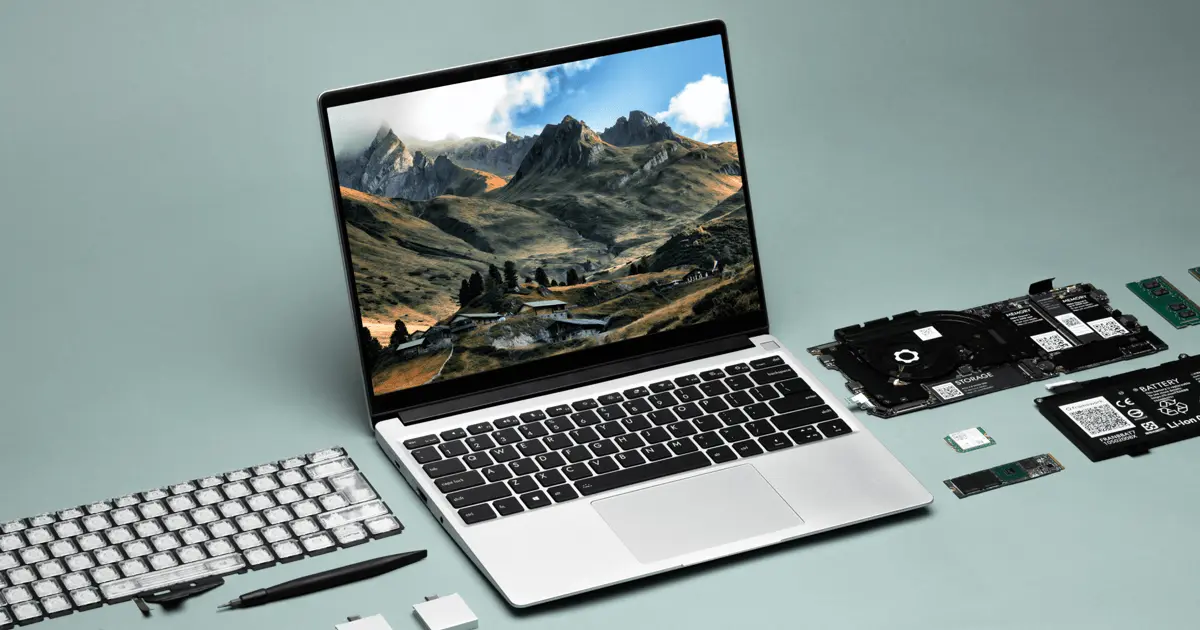
I've been waiting for a few months for the marketplace to get an International English Linux keyboard in stock, as well as the 61Wh battery (both for 13") to upgrade.
Does anyone know what their intent is there? Do you just wait for a bunch of people to batch up with the "Notify Me" list, or do they intend to just keep a few of everything in stock and it's been a bad luck streak for me?
Fedora seriously impressed me when I tried it out. It was by far the most polished and stable OS I'd seen after a string of distrohopping beauties-lacking-substance for daily driving. Good choice!
I'm sorry for your suffering and heartache. I wish you the best.
I've been running Pop!_OS 22.04 and more recently the 24.04 build with the new (alpha) Cosmic Desktop Environment. It's been wonderful to use--solid hardware, solid OS. For 3 years I built a company called Relm (a 3D world with video and audio, similar to gather town) and failed at the business, but it was the 13" Framework laptop that gave me a sense of freedom, ownership, and confidence that I could replace parts if needed, as I built the business and codebase.
What's your favorite OS on Framework?
If you're running Windows, what version and why? If Linux, what distro?
Great questions! I hope I can jump in without being too short.
I wonder if something like debatemap.app or kialo-edu.com would offer a better UX ("user experience") than Lemmy. I've also heard that substack.com has done a good job of attracting high-quality discussion (but I worry, what's stopping them from traveling down the enshittification path like all the rest?)
OTOH, I think online discussion itself has some weaknesses that can't be easily overcome--perhaps in-person, local discussion is (usually/almost always?) better. For example, one study indicates that engaging in political discourse with people online leads to an "uncivil comment rate" of 10%, while a "mixed political / non-political" discourse has a lower uncivil comment rate [1].
Personally, I find it to be generally true that I need to trust someone in one or more non-controversial areas of life before I take their controversial (to me) opinions seriously. Simple time and familiarity also helps.
[1] https://www.frontiersin.org/journals/political-science/articles/10.3389/fpos.2021.741605/full
This is almost completely true, but I would add the caveat that PWAs (progressive web apps) are not as easy to discover and less familiar to install as an app in an app/play store. It might also be because it's in Apple and Google's best interest to not streamline that. But it's still an obstacle nevertheless.
What would a good incentive structure look like? For example, would working with public school districts and being paid by them to ensure safe learning experiences count? Or are you thinking of something else?
I wonder if some of our intelligence is artificial. Being able to drive directly to any destination, for example, with a simple cell-phone lookup. Reading lifetimes worth of experience in books that doesn't naturally come at birth. Learning incredibly complex languages that are inherited not by genes, but by environment--and, depending on the language, being able to distinguish different colors.
A coffee bean is a seed from the Coffea plant and the source for coffee. It is the pit inside the red or purple fruit. This fruit is often referred to as a coffee cherry, and like the cherry, it is a fruit with a pit.
I appreciate the candid analysis, but perhaps "nothing to see here" (my paraphrase) is only one part of the story. The other part is that there is genuine innovation and new things within reach that were not possible before. For example, personalized learning--the dream of giving a tutor to each child, so we can overcome Bloom's 2 Sigma Problem--is far more likely with LLMs in the picture than before. It isn't a panacea, but it is certainly more useful than cryptocurrency kept promising to be IMO.
Is human intelligence artificial? #philosophy
Have you ever heard the story of the snake?
One evening, a man walks along a dimly lit path. He suddenly halts, his heart pounding with fear. Before him, on the ground, lies what appears to be a venomous snake. He freezes, paralyzed with dread. Only when a friend comes by with a lantern does the true nature of the object come to light: it is merely a piece of rope.
I learned this story from Thich Nhat Hanh, a Buddhist author. He would indicate with stories like this that our perceptions shape our reality. Often, we react out of fear and misunderstanding, seeing snakes where there are none. He said that mindfulness and deeper understanding can act like the lantern, illuminating the true nature of our experiences.
You're not alone in feeling like you bear the weight alone. I mean, with all you're doing, you're basically a church-on-wheels here. And I say that both as a compliment and as a reflection of our situation as a society--we need each other, we need neighbors, community, and we need help sometimes. And many people are feeling the "it's too much to do alone" conclusion. I don't think we were meant to be this way. I've been reading Seth Kaplan's "Fragile Neighborhoods" recently and I feel like my eyes are open to the deep loss in social capital or "collective efficacy" that previous generations had. We're in a period of innovating on new social structures. It's tough. Keep going. Play the long game, make friends and neighbors, and don't forget you're just human too. We need each other.
Aegis on Android is also very nice (and open source).
Why are cosmic apps so slow to load?
My laptop is running modern hardware with NVME drive and has 64GB of RAM. Running Pop!_OS 22.04 with Gnome/Wayland.
When I launch the cosmic-store or cosmic-edit (for example) via command line or launcher, each takes about 25 seconds for its app window to load. Loading the Pop Shop in the same fashion takes less than 1 second.
I saw a few lines indicating files couldn't be opened, and thought at first maybe my ulimit was set incorrectly, but there is plenty of headroom on my user (soft limit: 4096, hard limit: 1048576).
I do see a handful of logs that look questionable:
May 04 07:50:59 rosie systemd[2109]: app-gnome-com.system76.CosmicEdit-17126.scope: Couldn't move process 17126 to requested cgroup '/user.slice/user-1000.slice/user@1000.service/app.slice/app-gnome-com.system76.CosmicEdit-17126.scope': No such process May 04 07:50:59 rosie systemd[2109]: app-gnome-com.system76.CosmicEdit-17126.scope: Failed to add PIDs to scope's control group: No such process May 04 07:50:59 rosie systemd[2109]: app-gnome-com.system76.CosmicEdit-17126.scope: Failed with result 'resources'. ░░ Subject: Unit failed ░░ Defined-By: systemd ░░ Support: http://www.ubuntu.com/support ░░ ░░ The unit UNIT has entered the 'failed' state with result 'resources'. May 04 07:50:59 rosie systemd[2109]: Failed to start Application launched by gnome-shell.
What could be causing the cosmic apps to load so slowly?
Why do some websites have a "Continue Reading" button?
Some article websites (I'm looking at msn.com right now, as an example) show the first page or so of article content and then have a "Continue Reading" button, which you must click to see the rest of the article. This seems so ridiculous, from a UX perspective--I know how to scroll down to continue reading, so why hide the text and make me click a button, then have me scroll? Why has this become a fairly common practice?
Is there such a thing as split-screen grep?
I want to run a command and see all of its output on the left hand side, while simultaneously searching/grepping for particular lines on the right hand side. In other words, I want a temporary vertically split screen in my CLI, ideally with scrollback on each side of the split, but where I expect the left hand side to be scrolling thousands of lines quickly, while on the right hand side is a slow accumulation of "matches" to my grep.
Is this possible today? What tools would you recommend to accomplish this?
EDIT: To be clear, a one-liner is preferable over learning tmux or screen, although this does motivate me to perhaps begin learning tmux.
In case this is an X/Y problem: The specific command I'm trying to run is an rsync simulation (dry-run) where I want to both check that the command works, and subsequently check that there are no denied errors. The recommended way to do this is to run the command twice, as follows (but I want to combine it into one pass):
```
first specify the "-n" parameter so rsync will simulate its operation. You should use this before you start:
rsync -naP --exclude-from=rsync-homedir-local.txt /home/$USER/ $BACKUPDIR/
check for permission denied errors in your homedir:
rsync -naP --exclude-from=rsync-homedir-local.txt /home/$USER/ $BACKUPDIR/ | grep denied ```
LazPaint is surprisingly good
LazPaint is a surprisingly good image editor.
I've looked around at many raster image editing apps for Linux, and I have mostly been disappointed.
- The Gimp is hard to use and has lagged behind major other platforms' banner image editors.
- Pinta is "ok" but has graphics glitches on my hardware (Intel).
- Inkscape is good but specializes in vector graphics, not raster images.
- Krita looks like it might be particularly good for artists using a tablet, but is mediocre for raster image tasks and has a complex interface.
I've also tried various "simple" apps such as KolourPaint [1] and Drawing [2], but these are generally more like "MS Paint" and have limited capabilities when importing images for various editing tasks.
LazPaint has all of the major features you would expect, without an over-complicated UI--selection, layers, gradients, filters, shapes, opacity, many file formats etc.. However, it is not wrapped in a Flatpak, so you need to download the "deb" file and install with Eddy (or the CLI):
https://github.com/bgrabitmap/lazpaint/releases/tag/v7.2.2
As an aside, I recently also discovered Pixelitor, and I think it's another one to keep an eye one. The author seems to be making some great progress lately (most recent release in September 2023).
- [1] https://flathub.org/apps/org.kde.kolourpaint
- [2] https://flathub.org/apps/com.github.maoschanz.drawing
Why are there so few requests for Pop!_OS help here?
The pop_os subreddit has many Pop!_OS-specific help requests per day. I'm kind of surprised there aren't more here on the Fediverse/lemmy side of the community.
I browse looking for ways to help, and after having shifted my attention from Reddit to the Fediverse I feel like I could be helping out more. Why aren't there more requests here?
Undo the undo
Beginning Linux user: "Ctrl-Z is undo, right?"
Advanced Linux user: "Ctrl-Z dammit fg"
Emotions: A Code Book (Kent Beck)
What I write about my own personal journey is intended as just that—my personal journey. If you are having serious trouble, get help from a professional. Envy helped me realize that I was afraid that my social standing was at risk (because of wobbly financials) & helped me do something about it (edi...

Kent Beck is a computer scientist and author. In his post, he takes a more personal turn. His "code book" for emotions is insightful.
This list reminds me of the importance of listening to our own emotions--complex signals of inner state (inner facts) that carry great significance if we're to gain deeper insight into our motivations, and then go on to improve our world and the world in general.
Identifying our feelings can sometimes be a challenge in itself, but interpreting them is also a skill and depends on wisdom and knowledge. I'm not sure there is a perfect interpretation of each emotion, but I appreciate and learn from others (like Kent Beck) who attempt to simplify these feelings into clearer meanings:
- Fear—a call to focus. I need to increase a priority & let go of other things.
- Anger—a call to establish & enforce my boundaries.
- Anxiety—a call to pay attention to something I am ignoring.
- Flashbacks—a call to deal with my past trauma.
- Confusion—a call to step back & re-establish my intentions. For me this often takes the form of asking what I would do if I was serving my mission to help geeks feel safe in the world.
- Envy—a call to safeguard my social standing.
- Jealousy—a call to safeguard (or let go of) an important relationship.
- Hatred—a call to accept something about myself I don’t like.
- Boredom—a call to do something I am avoiding.
- Apathy—a call to accept that I am stuck.
- Guilt—a call to change.
- Shame—a call to accept myself & then change.
- Terror—a call to freeze in the face of fear (rather than run or attack).
- Sadness—a call to release something I’m attached to.
- Despair—a stronger form of sadness. I really need to release something I’m attached to.
- Grief—a call to honor loss.
- Depression—a call to understand deeply.
- Suicidal thoughts—a call to change. (I hesitated to include this. If this is you, get help. I’ve read too many “logical” geek suicide notes. My suicidal thoughts diminished when I learned to interpret them as saying, “I really don’t want to be in this situation.”)
Blender issues on Pop!_OS (xpost from /r/blender)
I am currently having issues with using Blender on my desktop computer where Blender just locks up/stops responding randomly while I manipulate positions of objects or node graphs. Blender never unlocks and there does not seem to be a consistent cause for this issue. All other programs run fine while Blender is locked up. My computer is not locked due to memory, CPU, nor GPU usage.
Please, if anyone can provide any information on this, I would greatly appreciate it!
Computer details:
Blender version: 3.6.1, only non-default add-on is MolecularNodes v2.7.4
OS: Pop!_OS 22.04
GPUs: GeForce GTX 1080, GeForce GTX Titan X (both pretty old, but still running strong with other visualization softwares)
GPU Driver: 535.104.05
CUDA Version: 12.2
CPU: Intel(R) Core(TM) i7-7700K CPU @ 4.20GHz
RAM: 32 GB
Edit: just noticed that Blender is still using 100% CPU (one thread of 8) even after being locked for 15+ minutes now.
Edit 2: Added Blender version and add-on details (duh).
Edit 3: This is not arising due to loading corrupt blender files. I just started a fresh run, recreating the desired blender process for the visualizations that I am interested in, and the program still locked up.
Scar Tissues Make Relationships Wear Out (John Ousterhout)
talk given by John Ousterhout about sustaining relationships - scar_tissue.md
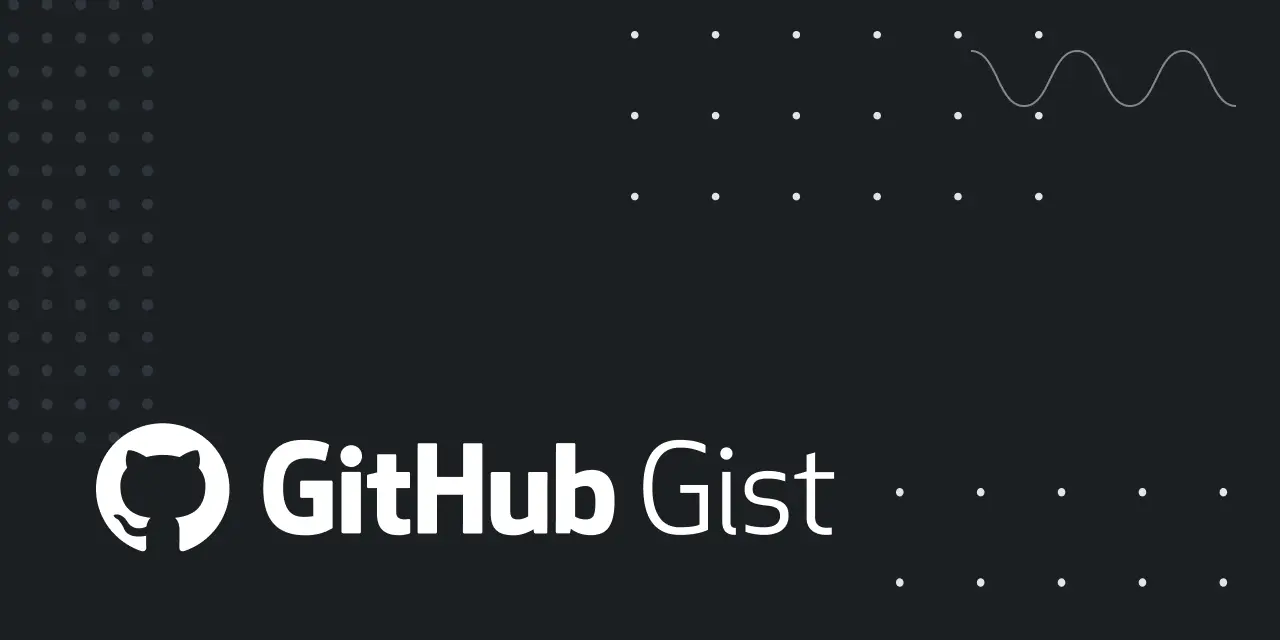
It’s really hard to build relationships that last for a long time. If you haven’t discovered this, you will discover this sooner or later. And it's hard both for personal relationships and for business relationships. And to me, it's pretty amazing that two people can stay married for 25 years without killing each other.
But honestly, most professional relationships don't last anywhere near that long. The best bands always seem to break up after 2 or 3 years. And business partnerships fall apart, and there's all these problems in these relationships that just don't last. So, why is that? Well, in my view, it’s relationships don't fail because there some single catastrophic event to destroy them, although often there is a single catastrophic event around the the end of the relationship, but that’s typically a symptom rather than a cause. What typically happens is it accumulates in the little things that just build up over time, and I call those scar tissues. And the reason I use the phrase "scar tissues" is because scar tissue is when you have a wound that doesn't heal quite properly and you get this other tissue that just sort of fills the gap, which is called scar tissue, and that tissue is not as strong as the original tissue that was there. So, scar tissue is weak. So, what happens in relationships is that sooner or later, there's a conflict. It happens in all relationships and not all of them get resolved perfectly. So, now somebody's left feeling just a little bit unhappy about the result, mostly okay but just a little bit unhappy. But then it happens again... and it happens again in a different situation and no one of these is enough to kill the relationship, but over time that annoyance just builds up more and more and more and more, and then people start seeing patterns in behavior. You know if you ever hear the phrase "You always X": scar tissue.
So people start becoming sensitive and then they expect the bad behavior and there's nothing more guaranteed to create bad behavior than expectation. You will find it if you see it. And so eventually it just gets worse and worse and worse and worse, and then somebody decides they just don't care anymore and typically that's the point where something spectacular happens and the relationship collapses. And people often think it was the spectacular thing that wrecked the relationship, but really it was all those little bits of scar tissue building up over months or years. And my opinion is that in most of these situations the people aren't fundamentally bad, though they often appear bad, typically at the spectacular end phase of the relationship. It's just that the relationship wore off. Just wore off: too much scar tissue.
So, I'll give you an example of a relationship of mine that wore off. So, we had our house remodeled a couple years ago. Major remodeling of our kitchen and family room, and the foreman for the contractor, Jim, was in our house for every day for about 4 months during the work on the job. And it started off and things were fine, but then there were just little things that started happening. Like he wouldn't seal up the plastic around the kitchen, and so, dust would get in to the rest of the house. And most of the work he did was really great, but if he ever made a mistake he wouldn't want to admit it; he would kinda make excuses to try to avoid fixing his mistake, and this just got more and more annoying for me. And I'm sure I did my share in return because I'm sort of a perfectionist, and I probably noticed every little thing he did that wasn't absolutely perfect, and it probably drove him crazy that every morning when he came in, I was there standing in the kitchen ready to tell him about all the mistakes he made yesterday [Laughter], and so it just got worse and worse and worse to the point where we were barely on speaking terms at the end of the project, and one day our daughter came in, and she was like, “Dad I think your relationship with Jim is wearing out,” [Laughter] which was when I realized I shouldn't be telling her my theories about relationships.
Now, I could have sat down with Jim to try to work it out, but I decided since it was only a 4 month contracting job, I'll just put up with it, and you know, it'll be done in a while. He would have been pretty worried if we sat down and I was like, “Jim, can we talk [Laughter] about my feelings? I mean you left the plastic open and dust got into the house, and sometimes I feel like you don't respect me as a person.”
Now maybe if I tried that he would instantly change his behavior just to make sure we never, ever had to have a conversation again. [Laughter] So, the solution is if you want a relationship to last a long time, somehow you have to keep the scar tissue from building up. And that's really hard. So, when there's an issue, you somehow have to resolve it where there is zero lingering animosity. Nobody is even a little bit upset. Because even a little upset, that scar tissue that accumulates, that never goes away. And that's really hard to do; I don't have any perfect answers for that; it's communication and compromise. Both people need to be willing to listen to understand the other person's view and then you have to find some compromise where everybody agrees that's a fair trade off so nobody’s upset. So, that's really hard, and if either person can't listen or can't compromise, the odds are not good long term for that relationship. But there are classic mistakes people make. Like, some people are just too nice, and they wreck the relationships. They think, “Oh, it's not a big deal, it's just one little thing, not worth having a big argument about it. I'll just give in.” Well, that seems generous, but it's a really bad idea. You have to ask yourself, "Are you really, completely, 100% over this? You're giving in? No animosity? You're not secretly hoping that maybe they'll do something for you in return or a little behavior change here or there?"
Because if there's anything at all when you're giving in that you can feel bad about later, you're nuking the relationship - you're creating scar tissue with yourself, and that will build up to the point where you wreck the relationship. And the flipside is also bad. You may think, “I'm such a good arguer, I can just argue this person to death, and whatever they want I can just outargue them: I'll yell louder with more words, and I'll get my way. Whew! That was a great, great resolution, I got my way.” Well, you're nuking the relationship, sorry. So, somehow both people have to be completely satisfied with the outcome. So, the irony of this is, I think it's not the big things that nuke relationships it's all those little things. Even if there's a big thing, the relationship was going to die really soon anyway. So, just think about your relationship experience and the people around you. How many of you have either had a relationship that wore out like this or you've seen somebody around you and you could see their relationship wearing out?
[90% of a 300+ class raises their hands]
Yeah, it happens to everybody and we've all been there. And the trick is, again, you just have to avoid the creation of scar tissue. Not easy, but it's the only solution. Okay, that's my thought for the weekend
Is it possible to switch to zstd or lz4 initrd/kernel compression for faster boot?
I'm exploring ways to shave a few seconds off of my boot time, and I came across a post that stated, "my initrd is pretty small--doesn’t really load much--and Arch also defaults to using zstd which is also faster to decompress versus gzip."
What compression does Pop! use for initrd and the kernel? When I run ls -al /boot, I see files such as 14M vmlinuz-6.4.6-76060406-generic and 119M initrd.img-6.4.6-76060406-generic. Are these compressed?
Lastly, is there a way to choose the compression of these boot files without a custom kernel build? Or is what I'm trying to do "off the beaten path" and going to lead to "you have to compile your own kernel from here on out"?
Does journaling make you a better listener?
I enjoy writing in a journal. I don't do it every day like I used to, but I do it frequently when going through emotionally intense periods of life. This seems to be a healthy balance for me--use the skill when it is most useful.
This started me thinking--is journaling also beneficial for those near us? For example, does listing out or even working through feelings in a journal also help us to take things less personally, perhaps? Or to be able to hear someone out without needing to interject our story?
(Ostensibly, because we've already had a chance to "write our story down" somewhere, almost like we are hearing ourselves out?)
Partner One: “I feel really discouraged today…” Partner Two: “Come take a walk with me, it’s a really beautiful day out.” Partner One: “I’m so frustrated with the people at work, they spend all day complaining.” Partner Two: “You should just quit, we can get by on my salary for a while.”
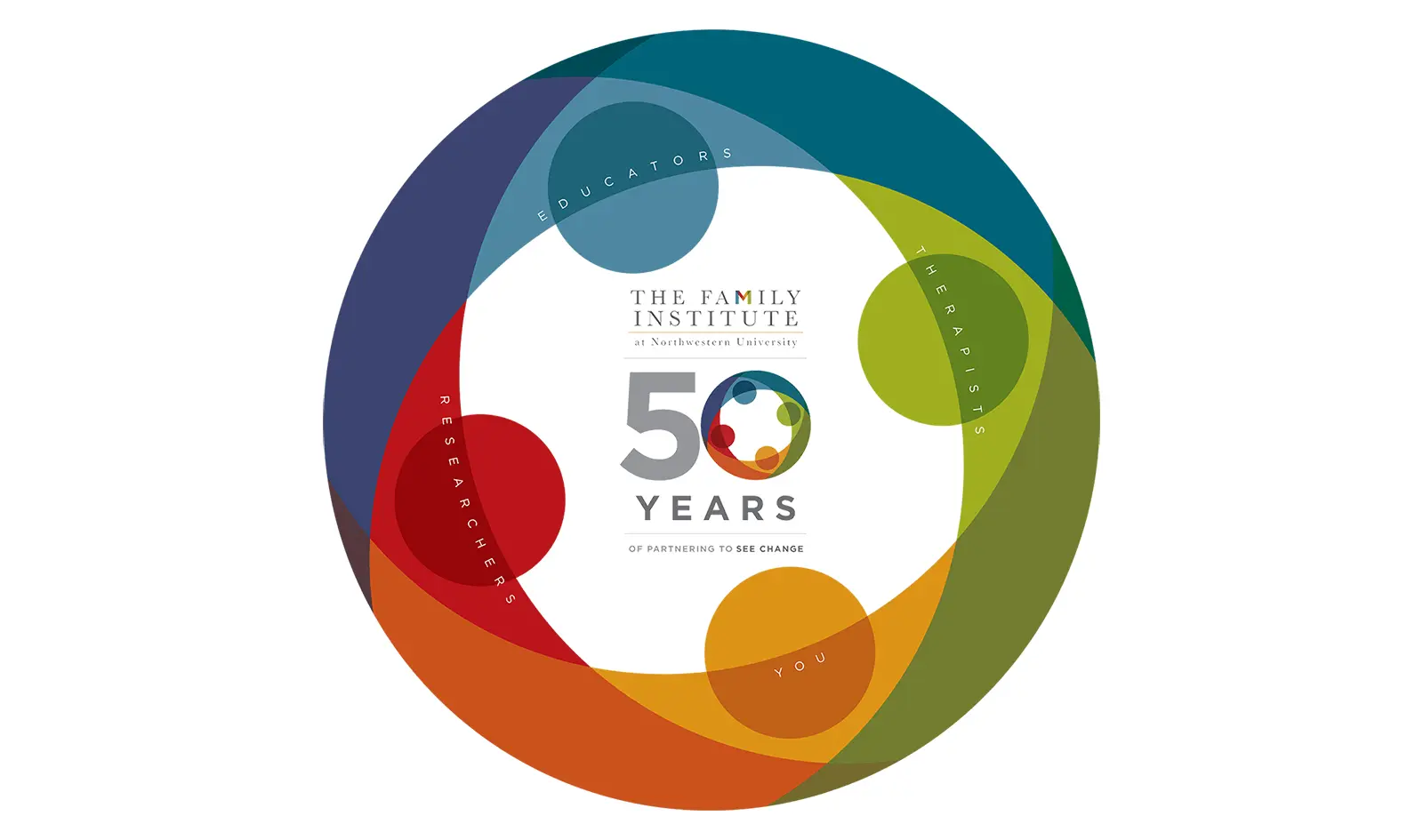
The Family Institute at Northwestern University has a "tip of the month" newsletter for couples that I receive in my email inbox. I liked this one:
Trying to fix emotions, example 1:
- Partner One: “I feel really discouraged today…”
- Partner Two: “Come take a walk with me, it’s a really beautiful day out.”
Trying to fix emotions, example 2:
- Partner One: “I’m so frustrated with the people at work, they spend all day complaining.”
- Partner Two: “You should just quit, we can get by on my salary for a while.”
Trying to fix emotions, example 3:
- Partner One: “We never hear from the kids. It bothers me that they don’t call once in a while to see how we are.”
- Partner Two: “They’re busy with their own lives. You shouldn’t let it bother you, it’s not that big a deal.”
> See the pattern? These are examples of the three most common ways we try to change — or fix — our partner’s negative emotions. In the first example, Partner Two suggests looking on the bright side as a way of lifting one’s spirits. In the second example, Partner Two becomes Mister or Miss Fixit, offering unsolicited advice that they hope will provide relief. In the third example, Partner Two admonishes his partner for feeling the way she does. Each response invalidates what Partners One are feeling; each fails, in its own way, to acknowledge through empathic listening the negative emotion that’s being expressed. That failure leaves Partners One feeling alone and without a sense of being seen and heard by the one person they most wish would understand them (see Empathy Advantage).
> Why is emotion-fixing so common? In part, we never learned that empathic listening is the far superior way to respond to a partner’s distress. The skill of empathic listening doesn’t come to us naturally; it’s something that’s learned either through formal instruction (view the short videos below) or by watching it modeled by the people around us. On a deeper level, emotion-fixing is something we do because emotional pain tends to be contagious and we ourselves don’t want to feel badly. Our brains are wired, through mirror neurons, to feel what others are feeling, whether positive or negative. Without realizing it, we protect ourselves from slipping into a negative place by trying to help — to “fix”— our partner’s painful emotions.
> The skill of empathic listening strengthens all our relationships, whether it’s with our primary partner, our children, or our friends. Few experiences promote a stronger bond between people than feeling seen and heard in our emotions. The skill applies across all age groups (although we may choose different words depending on whom we’re talking to). Watch how empathic listening is used by the parents in the short videos below and try it with your partner the next time you hear even the smallest expression of negative emotion.
I say dog, you say chicken? New study explores why we disagree so often
New research shows our ideas about even the most basic words vary widely, helping explain why we talk past each other.

Additional discussion at https://www.reddit.com/r/listening/comments/11urtp8/i_say_dog_you_say_chicken_new_study_explores_why/
What's the best advice you've been given for your relationship with your spouse/partner?
My father-in-law told us both when we were married: "Remember that sometimes you will be a friend to one another, and other times you will be a parent. Everyone needs to cry like a child sometimes."
Do you have any advice that you've been given that helped you be a better partner?
A New Peace Paradigm: Understanding our Human Needs (Paul K. Chappell)
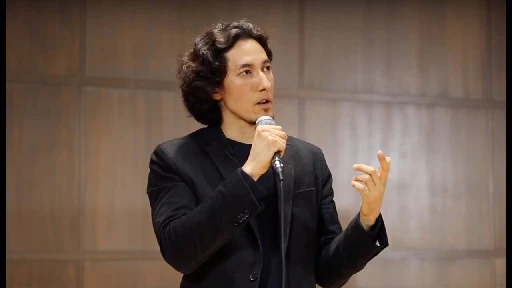
YouTube Video
Click to view this content.
This short presentation by Paul Chappell changed me. He outlines how unmet human needs can translate into the social disorders that we face today--things like school shootings, and depression. His personal story is one of "nearly becoming the bad guy" in a school shooting, followed by years serving in the military, and then finding his calling as a peace advocate.

